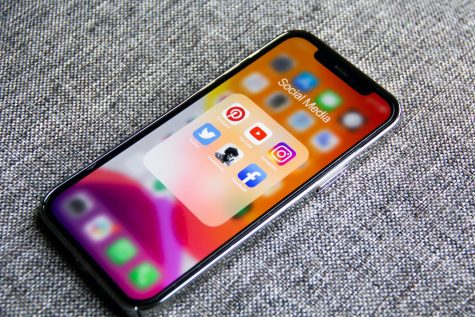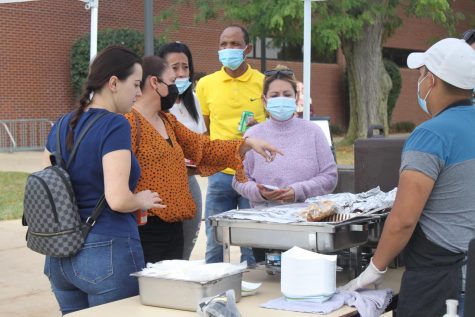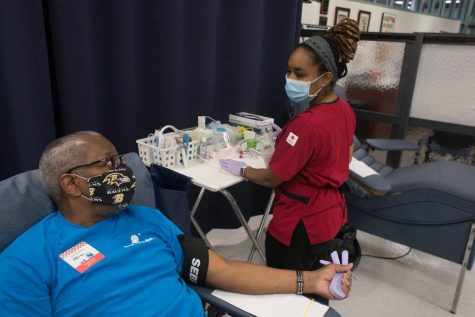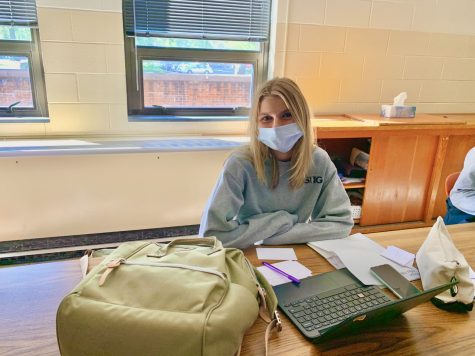The term ‘Fake News’ is detrimental to democracy
November 16, 2018
In February 2017, President Trump tweeted “The FAKE NEWS media (failing @nytimes, @NBCnews, @ABC, @CBS, @CNN) is not my enemy, it is the enemy of the American people!”
What exactly is ‘fake news’, and is the media our enemy?
The Lamp interviewed 11 Lincoln Land students to hear their views on the news, and 10 of them said they were familiar with the term ‘fake news’.
Joe Streder, who said he “never” reads the news, defines fake news as “CNN, mostly”.
When The Lamp asked Streder his opinion on Trump’s tweet, he said: “I think it’s the enemy of all people. Because constantly, people are taking things and throwing it into something that it’s not.”
Streder rated his trust in the media as a one out of 10, 10 being the most.
Shaye Virgin, another student, defined fake news as “something that can’t be verified. Something that doesn’t have evidence to back it up. Anything that’s on the news that is said once, it doesn’t come up again.”
Virgin said she watches NBC once a week, and believes that NBC is one of the most credible news sources available.
Claire Farnsworth rated her trust in the media as “a 7 or 6”, and she disagreed with Trump’s tweet.
“I think it’s bogus, I completely disagree with him,” Farnsworth said.
“I think that there’s a lot of reputable news sources out there and just because they criticize him, or his beliefs or his followers doesn’t mean that they’re fake news, it just means that they don’t agree with him,” she said. “There’s a lot of other problems that could actually be considered fake news that he just refuses to acknowledge because either they support him or they’re not talking about him at all so he doesn’t care.”
Farnsworth said she gets news daily, from a combination of social media and CNN.
Many American journalists have felt the effects of the president’s strong comments about the media, reporting verbal attacks while on assignment. Many also believe Trump’s comments encourage those with extreme views about the media.
Five journalists were killed in an attack on the Capital Gazette in 2018. The gunman had had a longtime dispute with the local Annapolis paper because one of their reporters once referred to a crime that he had been charged with.
According to the Committee to Protect Journalists, nine journalists have been killed in the U.S. since the year 2000. This list does not include Rebecca Smith, an advertising sales assistant who was killed in the Annapolis attack.
Out of these nine, six had “murder” listed as their type of death, and the other three had “dangerous assignment.”
Mexico was listed as the most dangerous country for journalists in 2017 by the International Press Institute, with at least 14 killed.
Attitudes are changing in the U.S. toward journalists, with 94 percent of Republicans and 42 percent of Democrats reporting that their level of trust in the media has declined over the past decade according to the Knight Foundation.
Jacob Cornett, Lincoln Land student, said that he found Trump’s statement extreme, and he disagreed with it.
Cornett then called The New York Times “a pretty sh*tty news outlet” and said that “propaganda is everything” with it.
The Times is one of the news outlets that Trump blasts the most often, and he refers to it as “the failing times”.
Glenn Kramon, a former assistant managing editor of the Times, defines fake news as “falsehoods and rumors spread to advance someone’s interests or harm the interests of others”.
“What troubles me is that fake news leads to confusion about what is true. For example, nearly half of almost 6,000 American college students surveyed said they lacked confidence in distinguishing between real news and fake news on social media, according to a new study by the Knight Foundation. And more than a third said the threat of misinformation made them trust ALL media less,” Kramon said.
Other students disagree with Trump’s assertion that the Times and other outlets are “failing”.
Kayla Houston, who said she reads the news daily, defines fake news as “something that promotes slander.”
Houston favors ABC and believes it is important to have some trust in the media.
“Cause to a degree, we do get news, and it’s true, for most of the time,” Houston said.
Free speech democracies rely heavily on journalists and media outlets to form their opinions about politics and current events, and U.S. citizens have a responsibility to do their part to defend the media.
There are a few simple rules people can follow to combat “fake news.”
- Always check your sources before spreading stories.
- It isn’t a good idea to rely on your friends or family to keep you up with the news. They may likely mean well, but most people misread or misinterpret the news at some point, and it is best to read for yourself.
- Steer clear of media outlets, especially TV news stations, that are known to lean one way politically.
- Form your own opinions, and don’t let your peers tell you what to think.
- Don’t use social media as a main news source.
Instagram, Facebook and Twitter posts are all accessible to everyone with few content restrictions. These models have their pluses, but they were not created to replace newspapers.
Anyone can post a paragraph about Donald Trump on Facebook, but you have to be qualified to write about him in The New York Times.
Social media is great for keeping in touch with friends, and even sharing political opinions, but leave the news to the professional reporters.
Meredith Howard can be reached at [email protected].









